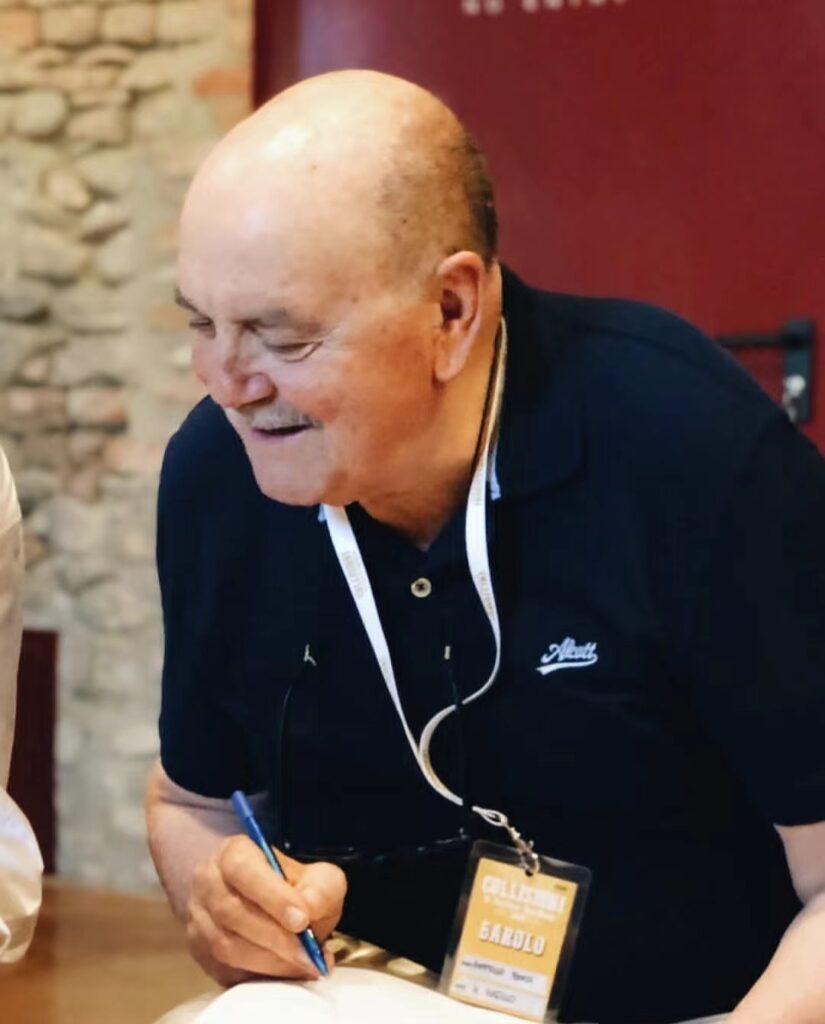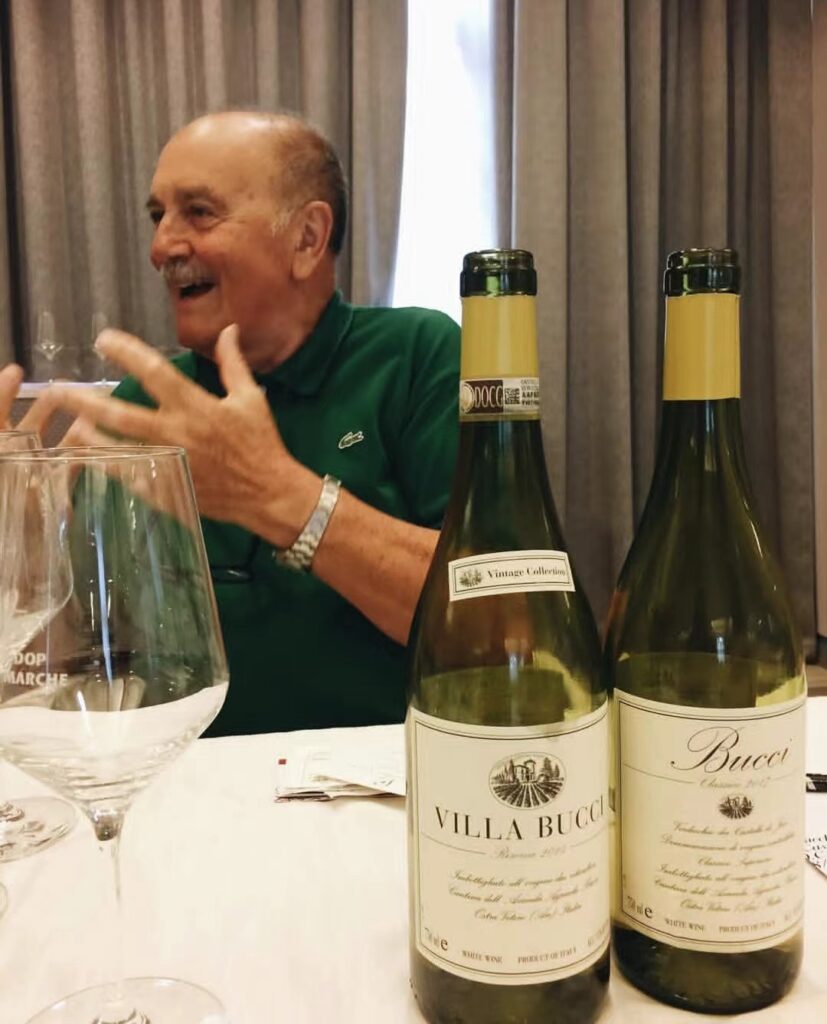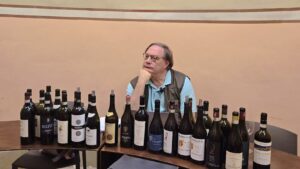In a world full of jerks, when a gentleman passes away, we are all the poorer for it. And make no mistake about it, we are all much poorer today.
On 25 August 2025, Ampelio Bucci, an emblematic figure of Italian wine and pioneer of Verdicchio dei Castelli di Jesi wine, passed away at the age of 89.

I have too many memories of the man to share. There are two that most stick with me.
The one time I had set up a vertical tasting of his Verdicchio dei Castelli di Jesi Riserva wine at his winery, but unable to reach him or anyone else by phone, showed up unexpectedly with seven or eight Canadian and American sommeliers and wine writers, all of whom wanted to experience his old vintages. Rather than be annoyed by the surprise of having his home overrun with unexpected guests, Ampelio burst out with genuine child-like glee, showcasing the infant that was still very much a part of his personality well into his “-ties” and that all those who knew him well had learned to recognize. He was so happy he disappeared into the cellar and came back lugging heavy magnums of older vintages, that he felt were necessary given the large number of tasters present. And we literally had to yank the bottles from him, because he insisted on carrying them up and down the stairs to the tasting room, a chore best avoided by a man no longer young.
The second time occurred years before, while strolling through one of his beloved Verdicchio vineyards, in early September. A heavy-set man, Bucci was sweating visibly (as was I): suddenly he stopped, looked at me, and said: “But Ian, it’s really hot, don’t you think? It’s too early in the year to be this hot. I have been monitoring this closely over the last few years, and I can tell you, the climate here is changing faster than anybody seems to realize. When we get back to the house I want you to look at some climate data with me and tell me what you think”. That was the first time any wine producer had ever mentioned to me the words “climate change”. It was at a time when nobody knew anything about it, or mentioned it, so imagine just how long ago it was. And yet, the visionary Ampelio was already there and thinking about it.
Ampelio was, to put it simply, one of the best people in Italian wine, a gentlemanly figure there are far too few of.
From the day of my first of many visits to his estate at Ostra Vetere to the heydays of Collisioni, when he regularly came up to Barolo with other talented Verdicchio wine producers to talk about and showcase his wines and those of his colleagues, Ampelio Bucci and his wines have always been a big part of my life. He and his wines will continue to be just that, still and forever.
+++++++++++
Born in 1936, Bucci was a great entrepreneur not only in the wine sector but also forged a noteworthy career in the world of fashion and design in Milan. Graduating in Economics in the 1960s from the Bocconi University in Milan, he gained experience in the world of fashion and design, contributing to the founding of the Memphis group alongside Ettore Sottsass (the founding father), Aldo Cibic, Michele De Lucchi, and other members (some of whom, like Andrea Branzi and Shiro Kumarata joined later) of the world-famous design movement. Also in Milan, Bucci founded Mies, a strategic consulting and training company that created new working methods and strategies for companies in the fields (how very appropriate to use that term with Ampelio!) of monitoring changes in social and consumption trends; brand and corporate identity building; creative management of the ‘Made in Italy’ (fashion, design, food, tourism); and last but not least, intelligence. He worked alongside the likes of Gianfranco Ferré, Giorgio Armani, Zegna, Elio Fiorucci (his great friend). He was also a university professor, as well as director of the management sector and then vice-president of Domus Academy, Milan’s post-university school of fashion, design and business management, during which time he wrote and published the book ‘The Idea-Driven Business’ on entrepreneurial creativity.

Bucci took his visionary approach to the field of winemaking as well. With land he had inherited from the family, he founded the Bucci wine estate in the early 1980s, a winery that literally revolutionized the way everybody looked at and thought about Verdicchio and its wines. He was the first to think that Verdicchio wines could age, and along with his life-long winemaker, Giorgio Grai and the rest of his valid team, matured his Riserva wine in large Slavonian oak casks (this in the day when people in Italy only wanted to drink young white wines, and anything more than two years old was deemed over the hill). Unlike 95% of Italian white wines, his Verdicchio dei Castelli di Jesi Riserva Villa Bucci could easily last for thirty-plus years. And in a sign of just how talented Ampelio and his team were, his non-Riserva Verdicchio dei Castelli di Jesi Classico, aged only in stainless steel tanks, was often just as good as the Riserva. Bucci’ wines were exported to over thirty different countries and won numerous prestigious awards over the years. Indeed, his Verdicchio Riserva was regarded by most wine experts as one of Italy’s fifteen best white wines.
In 2024, Bucci sold Villa Bucci to the Veronesi family, owners of the Oniverse group (ex- Calzedonia), whose wine sector is called Oniwines. Rather intelligently, his team was kept in place: Gabriele Tanfani, who worked for twenty-eight years alongside Bucci, as well as Gianni Gaspari, the winemaker who took over after Giorgio Grai’s passing.
Ampelio Bucci leaves an unforgettable mark on the Marche’s and Italy’s wine, having shown that Verdicchio could be a wine of great quality and longevity. His legacy will continue to live on through his older vintages and the lessons he imparted to all the younger generations of Verdicchio winemakers who followed in his large footsteps.
Condolences from everybody at the Ian D’Agata Wine Review to his surviving children, Riccardo and Roberto, and his wife Vanda.




